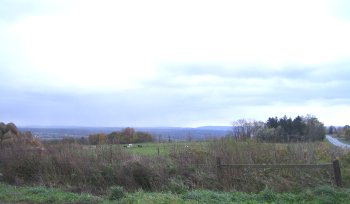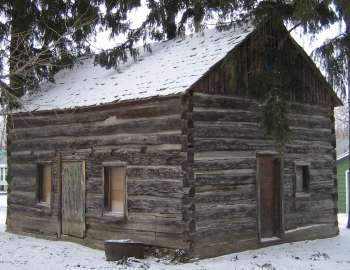- By Dan Veaner
- Around Town
 Print
Print
This week the word came that Bensvue Farm in Lansingville will receive $1,105,348 from New York State to preserve the 958 acre farm for agricultural use. The money comes from the Farmland Protection Program administered by the New York State Department of Agriculture & Markets. Farms that are accepted in the program sell their development rights to the State. The Town of Lansing served as applicant with help from Cornell Cooperative Extension and the County Planning Office. "If the farm families are interested, then we're certainly interested in supporting that," says Lansing Supervisor Steve Farkas. "We hope that others will take advantage of it."

Bensvue Farm will remain farm land in perpetuity
While there is no official plan for preserving Lansing's resources, the current Town Board has demonstrated a philosophy of saving the Town's heritage, with a patchwork of initiatives to preserve the town's history and flavor, and its resources. This includes taking a role in preserving Lansing's farms, the lake front, and participating in initiatives such as the Cayuga Wine Trail and the Erie Canal Greenway.
With 36,000 farms encompassing 7.6 million acres of farmland, New York State has helped protect almost 36,000 acres from development since 1996. Last year cloase to $2.5 million was allotted for the protection of farmland in Central New York. $3.4 million was targeted toward Long Island, more than $2.3 million for the Hudson Valley, over $1.5 million for Western New York, $1.1 million for the North Country, and nearly $300,000 for the Capital Region.
In April Chuck and Andra Benson were accompanied by Cornell Cooperative Extension's Debbie Teeter and Tompkins County Planning Office's Crystal Buck to ask the Town Board how they wanted to be involved. Teeter had approached local farmers to gauge their interest in selling their development rights and keeping their farms in their families, passing them from generation to generation. Town officials chose to be the applicant in the process. "We've set aside quite a chunk of land in the northern part of the town, which we want to do," Farkas says. Between the Benson farm and the Howser farm that was accepted in an earlier round of the program, nearly 1,400 acres of Lansing farm land will be preserved.

Lansingville's Bensview Farm
Salt Point is another instance where the Town has taken an active roll in preservation. The state land also known as 'U.C. Point' has long been neglected and plagued by litter, crime and unsupervised activities. The Town of Lansing signed a 25 year lease with the Department of Environmental Conservation (DEC) earlier this year so that the local municipality can manage the property. The result will be new nature trails, educational kiosks, specified hours of operation, and policing of the area that will allow more residents and visitors to enjoy the park in a safer, cleaned up environment.
But Farkas says that he wants to do more to preserve Lansing's lakefront and preserve what little land is left along the lake for the public's use. "If you go down to Lansing Station Road and south, that was all old vineyards," he says. "My dream is for the state to create a park on the lake to control the lakeshore. And for someone to set up a winery above that." Farkas has put out feelers to Erie Canal Program officials as well as King Ferry Winery owner Pete Saltonstall to investigate whether a state/county/town initiative could achieve something like this.
Deputy Supervisor Bud Shattuck has been working on preserving a different aspect of Lansing's heritage. He and a small committee of residents have been working on bringing the oldest log cabin in Tompkins or Cayuga counties home from the Cayuga Museum in Auburn to its original home in Lansing. Originally constructed in 1749 somewhere near Conlon Road, the cabin was owned by the North family, some of whom eventually migrated to Michigan where they named the town there 'Lansing.' Shattuck has said that his goal is to get grants to bring the 18' x 24' cabin home at no cost to taxpayers.

While the effort stalled this year, he hopes the cabin can be transported home to Lansing next summer. Town officials envision promoting a kind of historical trail that would include the cabin, the Field School House located near the Town Hall and other Lansing landmarks.
Meanwhile Farkas says the Town wants to do what it can to help Lansing's farmers. "I don't want to do anything that's going to cost the farmer more money," he says. "We don't want to put so many restrictions on them that they can't do anything. But I think we need to preserve that in reality and not go out and do a lot of switches and changes in the comprehensive plan to recognize and preserve that farmland."
He says that the smaller farms are struggling because of rising assessments and taxes. "We have some farms that are not big and not small," Farkas says. "They're in the middle. They're being put in a squeeze in some cases, of having to sell property to pay taxes. That really concerns me. I would hope the county would look at it, because they do the assessments. If they are going to continue to raise the assessments on our agricultural land, they are, in a sense, creating this situation."
The purchase of the Benson families's development rights goes a long way toward achieving these goals. "It couldn't be more appropriate," Farkas says. "I'm really glad for them, because they've worked really hard and they do so much in the community. We're proud for them, that's for sure."
----
v2i41

Bensvue Farm will remain farm land in perpetuity
While there is no official plan for preserving Lansing's resources, the current Town Board has demonstrated a philosophy of saving the Town's heritage, with a patchwork of initiatives to preserve the town's history and flavor, and its resources. This includes taking a role in preserving Lansing's farms, the lake front, and participating in initiatives such as the Cayuga Wine Trail and the Erie Canal Greenway.
With 36,000 farms encompassing 7.6 million acres of farmland, New York State has helped protect almost 36,000 acres from development since 1996. Last year cloase to $2.5 million was allotted for the protection of farmland in Central New York. $3.4 million was targeted toward Long Island, more than $2.3 million for the Hudson Valley, over $1.5 million for Western New York, $1.1 million for the North Country, and nearly $300,000 for the Capital Region.
In April Chuck and Andra Benson were accompanied by Cornell Cooperative Extension's Debbie Teeter and Tompkins County Planning Office's Crystal Buck to ask the Town Board how they wanted to be involved. Teeter had approached local farmers to gauge their interest in selling their development rights and keeping their farms in their families, passing them from generation to generation. Town officials chose to be the applicant in the process. "We've set aside quite a chunk of land in the northern part of the town, which we want to do," Farkas says. Between the Benson farm and the Howser farm that was accepted in an earlier round of the program, nearly 1,400 acres of Lansing farm land will be preserved.

Lansingville's Bensview Farm
Salt Point is another instance where the Town has taken an active roll in preservation. The state land also known as 'U.C. Point' has long been neglected and plagued by litter, crime and unsupervised activities. The Town of Lansing signed a 25 year lease with the Department of Environmental Conservation (DEC) earlier this year so that the local municipality can manage the property. The result will be new nature trails, educational kiosks, specified hours of operation, and policing of the area that will allow more residents and visitors to enjoy the park in a safer, cleaned up environment.
But Farkas says that he wants to do more to preserve Lansing's lakefront and preserve what little land is left along the lake for the public's use. "If you go down to Lansing Station Road and south, that was all old vineyards," he says. "My dream is for the state to create a park on the lake to control the lakeshore. And for someone to set up a winery above that." Farkas has put out feelers to Erie Canal Program officials as well as King Ferry Winery owner Pete Saltonstall to investigate whether a state/county/town initiative could achieve something like this.
Deputy Supervisor Bud Shattuck has been working on preserving a different aspect of Lansing's heritage. He and a small committee of residents have been working on bringing the oldest log cabin in Tompkins or Cayuga counties home from the Cayuga Museum in Auburn to its original home in Lansing. Originally constructed in 1749 somewhere near Conlon Road, the cabin was owned by the North family, some of whom eventually migrated to Michigan where they named the town there 'Lansing.' Shattuck has said that his goal is to get grants to bring the 18' x 24' cabin home at no cost to taxpayers.

While the effort stalled this year, he hopes the cabin can be transported home to Lansing next summer. Town officials envision promoting a kind of historical trail that would include the cabin, the Field School House located near the Town Hall and other Lansing landmarks.
Meanwhile Farkas says the Town wants to do what it can to help Lansing's farmers. "I don't want to do anything that's going to cost the farmer more money," he says. "We don't want to put so many restrictions on them that they can't do anything. But I think we need to preserve that in reality and not go out and do a lot of switches and changes in the comprehensive plan to recognize and preserve that farmland."
He says that the smaller farms are struggling because of rising assessments and taxes. "We have some farms that are not big and not small," Farkas says. "They're in the middle. They're being put in a squeeze in some cases, of having to sell property to pay taxes. That really concerns me. I would hope the county would look at it, because they do the assessments. If they are going to continue to raise the assessments on our agricultural land, they are, in a sense, creating this situation."
The purchase of the Benson families's development rights goes a long way toward achieving these goals. "It couldn't be more appropriate," Farkas says. "I'm really glad for them, because they've worked really hard and they do so much in the community. We're proud for them, that's for sure."
----
v2i41



